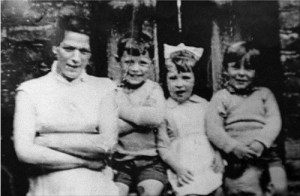Accounts of the [Northern Ireland] Conflict
Published in Editorial, Issue 3 (May/June 2014), Volume 22
Jean McConville with three of her ten children c. 1970. The Boston College subpoena, the recent arrest of Ivor Bell in relation to the Jean McConville case and the media storm resulting from both events are giving rise to speculation that oral histories of the Troubles will no longer be viable. This is not the case.
A new project currently under way at the International Conflict Research Institute (INCORE) based at the University of Ulster is seeking to preserve and make available the wide array of oral histories relating to the conflict in and about Northern Ireland. Accounts of the Conflict will consist of a digital archive, an on-line catalogue and a website where audio, audio-visual and transcripted oral histories will be available to stream and read. The project is funded by the European Union’s PEACE III programme, which is managed by the Special EU Programmes Body.
Researchers, web designers and digital media specialists at INCORE on the university’s Magee campus are currently securing the relevant permissions to store and make the material available, while also building the infrastructure required to ensure the most effective preservation and presentation. The project is highly relevant to current issues concerning dealing with the past in Northern Ireland—archiving and storytelling being prominent in the recent Haass proposals on ‘contending with the past’. Accounts of the Conflict will also be an invaluable resource for historians of the recent past.
The reality of the situation is that many of these oral histories are already available for those dedicated enough to seek them out. Some of them have been published on-line, on DVD or in print format. That which is available on-line is an important historical source, but the difficulty with much of the collected material is that it is often hard to find or get access to. For example, a community group may have been funded for three years to carry out interviews with 100 people. These interviews would then be archived, edited and perhaps released on DVD. At the end of the three-year period the group may not have had the resources to provide sufficient access, and the published outputs can often be difficult to track down.
This scenario is by no means general but it is the case in many circumstances and is a consequence of the model on which this kind of work is sometimes funded. What Accounts of the Conflict will do is to ensure that many of the oral histories that have been collected over the last twenty years are preserved and made as accessible as possible. Each individual interview and collection of oral histories will be contextualised with information from the existing CAIN (cain.ulster.ac.uk) website—a vast resource of materials relating to the conflict. The researchers on the project are willing to work with groups and individuals who are in possession of relevant oral history collections until the end of 2014. From 2015 onwards, there will be an electronic self-submission system on the website for anyone who wishes to ensure the careful preservation and wide availability of their collections.
For the public, these oral histories give a rich and varied view of life during the period of the conflict. They will prove to be a rich source of material for historians of the period owing to the variety of topics included, the demographics of the interviewees and the period covered. Some of the collections are quite general in their scope, but others concentrate on certain sections of the community. For example, a collection might record the experiences of prisoners—either their lives behind bars or their coming to terms with life after incarceration. Other collections might focus on the experiences of working-class women, ethnic minorities or children.
These oral histories will not necessarily give us insights about who did what to whom, or who was responsible for certain actions or atrocities. The Accounts of the Conflict project does not aim to pick up where the ill-fated Boston College Belfast Project left off. Rather, it will ensure that the huge amount of non-sensitive information that is out there is not overlooked. The Boston College subpoena, the recent arrest of Ivor Bell in relation to the Jean McConville case and the media storm resulting from both events are giving rise to speculation that oral histories of the Troubles will no longer be viable. This is not the case. Revelations about paramilitary violence and individual culpability are not the aim of most storytelling projects; rather they focus on everyday experiences of the conflict and its aftermath, using general ethical and practical principles used by social scientists for decades. What these collections give to historians is a raw source of information on how the conflict affected a wide spectrum of different people and what everyday life was like in the midst of a violent conflict.
It is unclear whether anything like the Bureau of Military History (BMH) witness statements will ever emerge from Northern Ireland. The Boston College Belfast Project controversy may well have a negative effect on the prospects of any official or unofficial truth-telling process commencing in the future. While the BMH statements are a treasure trove to historians of the revolutionary period, we have nothing from that era that compares to what Accounts of the Conflict will offer. Through these oral histories, historians have the ability to present a people’s history of the recent conflict and its aftermath. The lived experiences of those affected by, but not always directly involved in, the Northern Ireland conflict should be central to our understanding of the last five decades. Accounts of the Conflict will help ensure that historians look beyond the guns, the bombs and the politicians when assessing the history of Ireland in the second half of the twentieth century.
Adrian Grant is a researcher on the ‘Accounts of the Conflict’ project.
http://accounts.ulster.ac.uk/
















